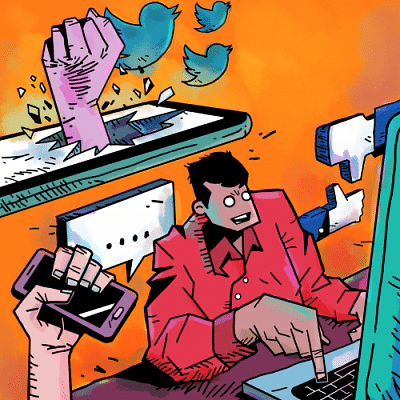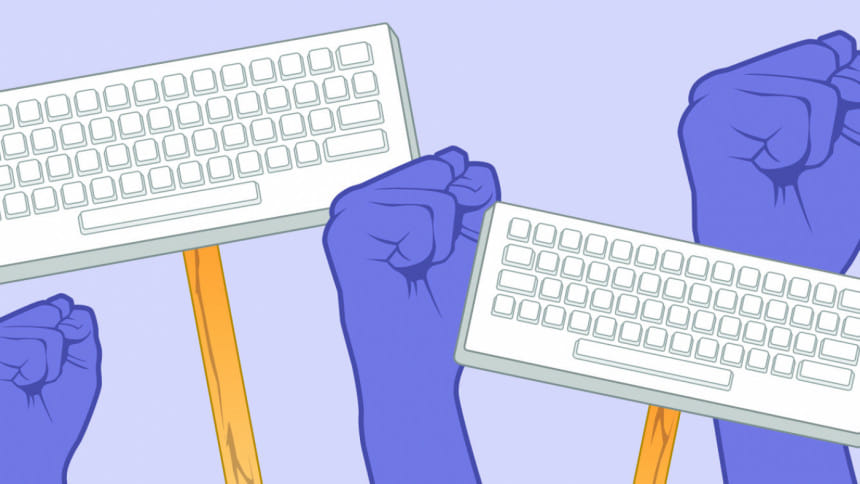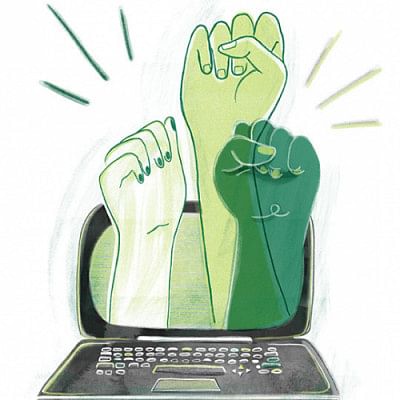Online Activism Is Here for Good

For a generation blamed for staying on their devices for too long, internet or online activism seems like the perfect way to have people's voices heard. Sadly, it is often seen with derision, and readers of this article likely know why. The adverse feelings appear to stem from many factors, some valid and some not so. One of which is that online activism is pointless, but that is far from the truth.
A September 2020 article on BBC Future discusses the issue, stating "Evidence collected over the last decade suggests that clicktivism, in the aggregate, can be very effective in spreading little-known ideas and publicising non-mainstream notions."
This can be clearly seen if we look at Instagram accounts such as @soyouwanttotalkabout, @girlsagainstoppression, and @nowhitesaviors which have all tackled heavy local, international, and historic incidents and issues of great significance – from the Tulsa race massacre to the trademarking of phrases, names and festivals that have had cultural meaning for people of colour for decades if not centuries by corporations.
Social media has given both access and opportunity to people as young as thirteen-year-olds to voice their concerns regarding matters that impact society and learn what they weren't (and might never be) taught in school. However, the very ease which provides benefits also brings along dangers that may not be immediately noticeable.
Another serious issue is the spread of misinformation. This isn't just limited to middle-aged or elderly people new to the Internet but even those who have been using computers since childhood. While remarkable feats can be achieved without a considerable amount of hassle because of social media, information not thoroughly checked and researched, fuelled by the intention to jump on the bandwagon of whatever topic is trending, can lead to spread of false information.
"In the era of fake news, it is always important to vet and cite sources before sharing any factual claims online, where misinformation can spread like wildfire. While it can be tempting to press the 'share' button on a post that resonates with us, the need to ascertain its validity is more important. When we have highly customisable and accurate search engines, there is no excuse for not doing our due diligence," says Taqbir Huda, Coordinator, Justice for All Now (JANO, Bangladesh).
He adds, "For instance, when sharing stories of injustice from JANO, Bangladesh, which seeks to utilise the power of modern communications technology to increase social awareness and legal literacy in the country, we are always careful to link our sources so readers can immediately cross check for themselves. We should also be mindful about not conducting online activism in a manner that actually compromises the safety of the very people who are the subject of our activism."

"Wokeness" is frequently ridiculed, with the term evoked to frequently mock individuals who share posts regarding social issues on their personal social media accounts. Many perceive that this is a form of virtue signalling – an act of expressing support for a certain issue with the sole intention of portraying good character. This is not to say however, that it can never take on a more malign form. With individuals, this can look like bullies preaching kindness. On a more serious note, this provides the means to problematic and dangerous individuals to easily craft an image which paints them not only as harmless but can work to invalidate the claims of their victims.
With corporations, the use (better read: misuse) of online activism to promote an image that not only skews with their actual activities but hides and distracts from practices that could in reality be criminal masks a much darker reality.
An article by Wired titled "Google, Microsoft and the strange world of corporate greenwashing" highlights this phenomenon with examples of firms like Microsoft and Chevron running commercials and publicising initiatives to disguise their complicity and direct action in damaging the wildlife and the environment –problems they claim to be committed to solving.
The issue primarily seems to stem from the extreme visibility of online activism and the insincere efforts it subsequently attracts. Hence, one of the focuses of discussions on anti-discrimination has been the idea of non-optical allyship, with optical allyship being defined by author and online activist Latham Thomas as "allyship that only serves at the surface level to platform the 'ally,' it makes a statement but does not go beneath the surface and is not aimed at breaking away from the systems of power that oppress".
Taqbir resonates, "We should realise that speaking out against injustice is not an act of charity towards the oppressed which they should be 'grateful' for, but a basic civic duty that we owe to any group facing injustice, and to ourselves. Therefore, when conducting activism online it's important to be mindful about not furthering the saviour complex that defines the international aid industry, which funds much of the activist spaces in the Global South. While we should always demand justice for a particular individual or group facing injustice, we should not be the one dictating or pre-empting what 'they need', as that is for them to decide. If for any reason they choose not to or are unable to speak for themselves, only then can we speak on their behalf, but every effort must be made to consult them first so we truthfully capture their experiences and demands. We should not aim to 'save them' but to stand beside them in solidarity."
Therefore, the way to increase the impact of online activism involves not just partnering social media with physical protests and community organising, but investing in deeper learning and decentring of the person making the posts.
While social media has created space for opinions and open dialogue of the general population, it comes with its own set of limitations for people who use it to make their voices heard.
Mayabee Arannya, Team Leader at Kotha and an ally of the alliance Feminists Across Generations, shares, "Sometimes, messages online can be misinterpreted or diluted to something that it does not represent. Due to the rapid spread of information that can happen online, it's just as easy for the wrong information to spread as it is for the right. This is why the framing and wording of any online content published within a social movement have to be carefully chosen.
"As with activism on the ground, there are safety and security issues regarding online activism. Since anyone can hide behind an online profile and access your content, you become vulnerable to hate messages and threats. While visibility is essential to social movements, it can be dangerous speaking out online about sensitive issues and having people with unkind intentions know your identity."

Furthermore, according to vice chairperson of Oroddho Foundation Ikram Hossain Akif, one of the major limitations of spreading messages through social media is the way social media algorithms work only to allow people to follow content they interact with, resulting in posts with particular messages not being shared outside a particular circle of people.
Still, it is important to understand that online activism has made a huge difference when it comes to making a real change and has a great deal of advantages too.
"One of the most apparent advantages of online activism is that the internet allows us to instantly connect with large groups of people to get our message across. Whether it be for rallying people to join a protest or sharing information on a critical social issue, social media networks have the power to simplify the process of reaching out to larger communities," mentions Mayabee.
She adds, "Another vital aspect is accessibility. Since people all over the world have access to the internet, it can sometimes be the only tool available to seek out international solidarity and aid. The internet is free and ours (most of the time), so even when traditional media is suppressed, we can use our own online platforms to keep fighting for ourselves and our communities. Online platforms are especially important for people who are part of communities whose voices are not usually included or amplified in traditional media.
"Documentation is important. Having a smartphone and access to social media can enable us to document instances of injustice and share them instantly. If our lived experiences aren't proof enough of our oppression, we can also have pictures and videos as evidence. Oppressors can't keep the world in the dark about the crimes they commit as long as we can document, share, and demand justice." We think of online activism as activism from the comforts of our home. The reality is that it is the only way for many, and even when it isn't, its impact is undeniable.

 For all latest news, follow The Daily Star's Google News channel.
For all latest news, follow The Daily Star's Google News channel. 



Comments